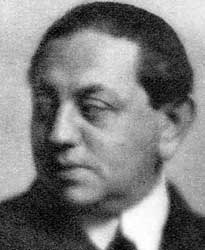Paul Leni
| Paul Leni | |
|---|---|
 |
|
| Born |
8 July 1885 Stuttgart, Germany |
| Died | 2 September 1929 (aged 44) Los Angeles, California |
| Cause of death | Sepsis |
| Nationality | German |
| Occupation | Film Director, Art Director |
| Years active | 1913-1929 |
| Notable work | The Cat and the Canary, The Man Who Laughs |
| Movement | German Expressionist Film |
Paul Leni (8 July 1885 – 2 September 1929), born Paul Josef Levi, was a German filmmaker and a key figure in German Expressionist filmmaking, making Backstairs (Hintertreppe, 1921) and Waxworks (1924) in Germany, and The Cat and the Canary (1927), The Chinese Parrot (1927), The Man Who Laughs (1928), and The Last Warning (1929) in the U.S.
Leni was born to a Jewish family in Stuttgart. He became an avant-garde painter at the age of 15, he studied at Berlin's Academy of Fine Arts, and subsequently worked as a theatrical set designer, working for a number of theatres in Berlin (but not with Max Reinhardt).
In 1913 he started working in the German film industry designing film sets and/or costumes for directors such as Joe May, Ernst Lubitsch, Richard Oswald, and E. A. Dupont.
During World War I, Leni started directing as well with films such as Der Feldarzt (Das Tagebuch des Dr. Hart, 1917), Patience (1920), Die Verschwörung zu Genua (1920/21) and Backstairs (1921). Waxworks (1924) was planned as a four-part omnibus feature, but the last part was not shot when money ran out. He also made a series of unusual short animated films Rebus-Film Nr. 1 - 8, which were filmed crossword puzzles.
Leni designed short prologues for festive film premieres in Berlin cinemas, such as Lubitsch's Forbidden Paradise (1924), Herbert Brenon's Peter Pan (1924), and E. A. Dupont's Variety (1925).
...
Wikipedia
